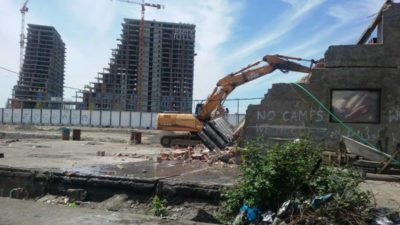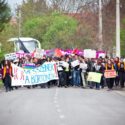September 2015. Tens of thousands of people are on their way to Western Europe. Thousands are stuck at the Keleti train station in Budapest. On the 4th of September, in increasingly difficult conditions, they decide no longer to wait for the trains to take then on, but start walking towards their destination. As in the case of a collective push to open the border at the Greek-Macedonian border two weeks earlier, the goal of the March of Hope is clear: cross the Hungarian border, then go to Austria, Germany or further, with the hope of security and better living conditions. Finally in the middle of September, when the last meters of Hungarian border fence are sealed with barbed wire, there is a clash between refugees and the police in Röszke. People direct against fortress Europe of foreclosure and against the border regime as an expression of racist nationalism – and decide to disobey it and to cross the borders.
During this time, numerous convoys from Germany start to show practical solidarity on the so-called Balkan route. In catastrophic conditions, they assist people on the move, through the supply of a warm meals. The developing dynamics lead to discussions, whether this is humanitarian aid, political activism or something else. State structures benefit from the work of these people. They are now busy in reestablishing the lost control. For this, trains and buses are chartered to bring people to where they want to go. In 2017, only detention prisons and border fencing remain.

Röszke has disappeared from the media long time ago. It has become quiet in this small border village. A deceptive idyll, which only exists because Hungary has completely closed off its borders. 19 months after the refugee protests, a demonstration passes through Röszke. The participants shout: “Nem kell a kerités, szabadság!” (“We don’t need fences, freedom!”) and “Vesszen a fasizmus!” (“Down with fascism!”). They are directed at the Hungarian fascist system, which has closed all open camps, and is holding asylum seekers in a container prisons near the border. Even though much less people manage to pass through, the closing of the borders can never stop the movement of people. According to Médecins Sans Frontièrs, many people are severely wounded, many have their bones broken, in the attempts to cross. Refugees in Serbia report brutal pushbacks by the Hungarian police, which are legal at up to 8km distance from the border.
Pictures in Belgrade in April 2017 are reminiscent of pictures from the year 2015. Many people on the Balkan route are stuck there, because the surrounding states isolate themselves with powerful means. About one thousand people live in former warehouses near the railway station in Belgrade. Under a parking deck, minors sleep in tents. Several activist and humanitarian organizations are also on the ground. English courses and a sports facility are self-organized. Demonstrations and information events are being held. The most common languages spoken are Pashtu, Urdu, Farsi, English, German and Spanish. In the barracks, as the warehouses are rightly called, there is a charging station for smart-phones and improvised sanitary facilities. On the walls, signs in different colors are written: “The problem is borders” and “I am a person too”. In addition to these statements you can also read: “We need shoes”. Neither the ruins of old warehouses nor the personal equipment available are sufficient to protect people from cold and wet weather. Not only do people drown in the Mediterranean daily, but also people in the metropolis of Belgrade are dying as a consequence of the EU border regime. Even the two hot meals a day are organized by non-governmental kitchens.
At the beginning of May, the No Name Kitchen alerted via Facebook: “WE HAVE TO TALK ABOUT SERBIA.” The Commissioner for Migration and Refugees Serbia has announced the evacuation of the barracks. The people are to be accommodated in the official camps and forced to apply for asylum in Serbia. “The camp system in Serbia is an extended way of doing business in a fast way, is copy-pasted from other EU countries,” says the No Border Serbia collective. According to the state, camps should provide shelter and supply for refugees. In fact, they represent a further restriction of freedom for those who live in it. On the 11th of May, the evacuation starts in the early morning hours. Employees of the Commissariat for Migration and Refugees already sprayed insecticides in the halls the day before. Resistance is rising among the people living there, some of them starting a hunger strike.
Despite the protests, most of them are finally forced to get on buses. If people do not enter voluntarily, they are threatened with being deported to the closed camp in Preševo. Protest is also rising by supporting groups. The rooms of the No Name Kitchen were the first to be demolished. In the evening they write their struggle goes on, because they did not just come for cooking.
Behind the evacuation stands the large project Belgrade Waterfront of the Eagle Hills Company. New luxury buildings are planned, they would cover two million square miter of this urban area. What is described as an innovative “facelift” for the city on their website is a source of indignation. More than 200 tenants have already been deprived of their living space. Protests after the election of Prime Minister Aleksandar Vučić as the President of the Republic raised the topic of difficult living conditions in Serbia. Many people live extremely precariously, the average income is 350 euros a month, the youth unemployment at 44% and the social welfare system works only rudimentarily.
“Many people are fleeing from here because they have no other chance,” reports an activist. This makes it clear how difficult political activism is if one’s own existence is not adequately secured. The German government ignores this situation and in recent years has massively deported people back to the Balkan states, including some who left decades ago, or have never even lived there. This symbolizes the political pre-eminence of the German government. It has the freedom to decide on exacerbating asylum laws in the interior and relocating the devastating effects to the external borders.
The article is written by a feminist collective whose individuals are active in different anti-racist contexts. The question of how effective political activism is to be organized remains open. The decision to participate in the demonstration in Röszke and the visit to Belgrade came through existing contacts on one hand. On the other hand, it was still important to visualize the current situation on the Balkan route, as a continuation of the solidarity actions of 2015. We want to continue the discussion about (joint) political work with local activists. For this purpose, is scheduled to invite them to Germany to in September 2017.
